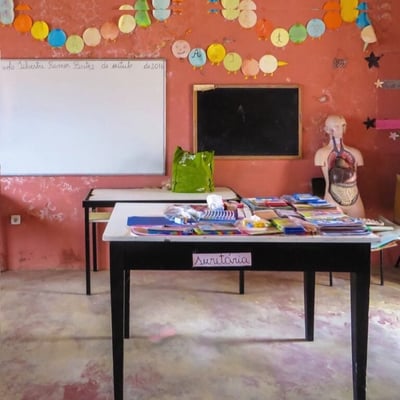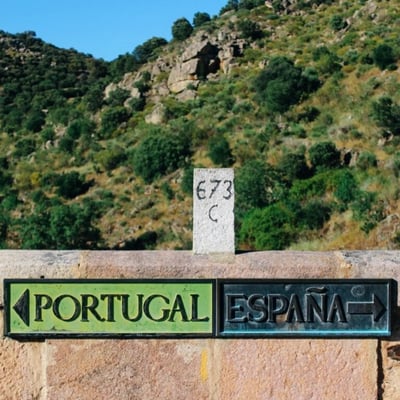1
00:00:03,032 –> 00:00:08,256
Professor: Alunos, vamos agora falar sobre o calendário. Para que é que usamos um calendário?
{{Teacher: Students, we are now going to talk about the calendar. What do we use a calendar for? (“For what is it that we use a calendar?”}}
2
00:00:09,045 –> 00:00:11,802
Júlia: O calendário mostra-nos as datas para o ano inteiro.
{{Júlia: The calendar shows us the dates for the whole year.}}
3
00:00:12,366 –> 00:00:15,875
Por exemplo, o meu aniversário é dia 6 de fevereiro.
{{For example, my birthday is February 6th.}}
4
00:00:16,304 –> 00:00:19,922
O calendário mostra-me em que dia da semana vai ser o meu aniversário.
{{The calendar shows me on which day of the week my birthday will be.}}
5
00:00:20,801 –> 00:00:23,095
Em 2022, vai ser num domingo!
{{In 2022, it will be on a Sunday!}}
6
00:00:23,689 –> 00:00:27,831
Professor: Isso mesmo. E de que mais se lembram, da nossa lição sobre o tempo?
{{Teacher: That’s right. And what else do you remember from our lesson about time?}}
7
00:00:28,395 –> 00:00:29,785
Duarte: Eu lembro-me de uma coisa!
{{Duarte: I remember something!}}
8
00:00:30,233 –> 00:00:31,100
Professor: Diz lá, Duarte.
{{Teacher: Tell us, Duarte.}}
9
00:00:31,624 –> 00:00:36,878
Duarte: Há 60 segundos num minuto. Há 60 minutos numa hora.
{{Duarte: There are 60 seconds in a minute. There are 60 minutes in an hour.}}
10
00:00:37,446 –> 00:00:42,587
Há 24 horas num dia. Há 7 dias numa semana.
{{There are 24 hours in a day. There are 7 days in a week.}}
11
00:00:43,164 –> 00:00:43,866
Professor: E os meses?
{{Teacher: What about the months?}}
12
00:00:44,332 –> 00:00:53,003
Duarte: Alguns meses têm 30 dias e outros têm 31. Fevereiro só tem 28!
{{Duarte: Some months have 30 days and some have 31. February only has 28!}}
13
00:00:53,646 –> 00:00:58,448
Professor: Muito bem! A menos que seja um ano bissexto… aí tem 29 dias.
{{Teacher: Very good! Unless it’s a leap year… then it has 29 days.}}
14
00:00:58,910 –> 00:01:01,540
Júlia: Ah, sim. E há 12 meses num ano…
{{Júlia: Ah yes. And there are 12 months in a year…}}
15
00:01:01,969 –> 00:01:03,547
Duarte: E 10 anos numa década…
{{Duarte: And 10 years in a decade…}}
16
00:01:04,023 –> 00:01:05,339
Professor: Vocês aprenderam muito!
{{Teacher: You’ve learned a lot!}}
17
00:01:05,823 –> 00:01:07,645
Júlia: Um século são 100 anos.
{{Júlia: A century is 100 years.}}
18
00:01:08,189 –> 00:01:11,011
Professor: Exatamente. E em que século estamos nós?
{{Teacher: Exactly. And what century are we in?}}
19
00:01:11,563 –> 00:01:12,567
Júlia: Século XXI?
{{Júlia: 21st century?}}
20
00:01:13,020 –> 00:01:16,618
Professor: Correto! Duarte, quais são os meses do ano?
{{Teacher: Correct! Duarte, what are the months of the year?}}
21
00:01:17,161 –> 00:01:32,505
Duarte: Janeiro, fevereiro, março, abril, maio, junho, julho, agosto, setembro, outubro, novembro, e dezembro.
{{Duarte: January, February, March, April, May, June, July, August, September, October, November, and December.}}
22
00:01:33,144 –> 00:01:37,424
Professor: Perfeito! E quais são as estações do ano? Júlia?
{{Teacher: Perfect! And what are the seasons? Júlia?}}
23
00:01:38,095 –> 00:01:42,586
Júlia: As estações do ano são o inverno, a primavera, o verão e o outono.
{{Júlia: The seasons are winter, spring, summer, and autumn.}}
24
00:01:43,047 –> 00:01:48,078
Em Portugal, o inverno é chuvoso e frio. Mas no final do inverno, começa a aquecer um pouco.
{{In Portugal, winter is rainy and cold. But at the end of winter, it starts to warm up a bit.}}
25
00:01:48,940 –> 00:01:53,771
Depois é a primavera! Eu gosto da primavera porque as flores começam a crescer.
{{Then it’s spring! I like spring because the flowers start to grow.}}
26
00:01:53,979 –> 00:01:58,679
Alguns meses mais tarde, já é verão, que é quente e cheio de sol.
{{A few months later, it’s already summer, which is hot and full of sun.}}
27
00:01:59,073 –> 00:02:02,364
No final de setembro, costuma ficar mais fresco.
{{At the end of September, it usually gets cooler.}}
28
00:02:02,699 –> 00:02:07,760
É o início do outono. Perto do fim do ano, o inverno começa, e fica mais frio.
{{It’s the beginning of autumn. Near the end of the year, winter begins, and it gets colder.}}
29
00:02:08,121 –> 00:02:12,146
Começa a chover mais vezes… e depois o ciclo recomeça!
{{It starts raining more often… and then the cycle starts all over!}}
30
00:02:12,634 –> 00:02:16,896
Professor: Muito bem, Júlia. Só um momento, deixem-me ver as horas.
{{Teacher: Very good, Júlia. Just a moment, let me check the time.}}
31
00:02:17,750 –> 00:02:22,761
Ui, já são 3 da tarde! Está na hora de ir para casa! Até amanhã de manhã!
{{Ah, it’s already 3 in the afternoon! It’s time to go home! See you tomorrow morning!}}
32
00:02:23,227 –> 00:02:26,334
Duarte: Desculpe, professor, mas amanhã é sábado.
{{Duarte: Sorry teacher, but tomorrow is Saturday.}}
33
00:02:26,996 –> 00:02:30,585
Professor: Pois é, tens razão! Sendo assim, até segunda-feira!
{{Teacher: Yes it is, you’re right. That being so, see you Monday!}}
 We respect your privacy and have a ZERO TOLERANCE for spam.
We respect your privacy and have a ZERO TOLERANCE for spam.
















What is called a ‘leap year’ in English occurs every four years, so I’m puzzled by the word ‘bissexto’, which looks like ‘twice-sixly’ to me.
Hi. Your comment prompted an insightful Google search 🙂 Turns out that ‘bissexto’ (twice sixth) derives from the Latin word ‘bissextus’, which referred to the sixth day before the 1st of March. This day, Feb 24, used to be duplicated on Roman calendars on every leap year, before the leap day was changed to Feb 29.
Excellent! Thanks. Them ‘ol Romans…
Wondering about “Sendo assim”, i.e. ‘that being so; in that case’. This seems incongruously missing from among the new expressions highlighted after the audio clip completing ‘O Tempo e as Estações’.
We’ve just added it! However, just remember that when in doubt, you can use the Translator tool to search. Below the translation, it will show similar words/phrases from our database, which can be added to your Smart Review.
First, I would like to complement the Practice Portuguese (PP) staff on the good work they have done in this application and continue to do. However, every so often I come across an English translation that could be better optimized. I found one in the O Tempo e as Estações (Time And Seasons) quiz. Here is my suggestion (because I have seen similar translations in my nearly 2 years with this application):
The dialog begins with, “Para que é que usamos um calendário?” The translation given in the application is, “What do we use a calendar for?” Note that “para” means “for” in English. “Para” starts the sentence, but the PP English translation puts the “for” at the end. This is grammatically correct, but not an ‘optimal’ translation. For a sense of consistency, simply place the “For” at the beginning of the sentence, “For what do we use a calendar?” which is also grammatically correct. The later sounds a bit more formal in English, and the former (PP translation) is more vernacular. I want to underscore, PP translation is not in error, however, “Para que” translated jointly better illustrates the meaning “For what” in English. The more general issue is ending an English sentence with a preposition, which is common and grammatically correct BUT NOT IN LATIN. You would know best, but I don’t think you could write the Portuguese question, “O que é que usamos um calendário para?” Do you see my point? Consistency is good! 🙂
Thank you for the kind feedback! I completely understand what you mean. It’s always a tricky balance with these translations, because we have to decide between what will sound natural and portray the meaning the best vs. what will match the Portuguese wording / word order. We also have to consider the tone. Many literal translations of Portuguese sound very formal in English, but we don’t always want to give the impression that the tone is more formal than it is.
I added a more literal translation after the question you mentioned to make that one more clear. There are some places where we can show both, but other times we have to choose one or the other for simplicity. In some cases it can distract from taking in the meaning as a whole. It’s a tough call because the option that will be most useful can even depend on where the particular person is in their learning process, their familiarity with English, and personal learning preferences.
In this example, we probably could have gone with just “For what…”, since it’s also correct, and would likely be understood by most, even though it’s less common to hear it that way. Unfortunately, it’s not always that straightforward! We went with a more natural-sounding translation for many of the question translations you’ll come across in the Units because we thought people would be more likely to search for similar questions that way. We wanted to make it more likely that they would be able to find what they’re looking for in Smart Review, the Translator, etc. Either way, we appreciate you bringing this up and we’ll keep all this in mind for future translations!
Verb form issue:
00:00:23 Professor: Isso mesmo. E de que mais se lembram, da nossa lição sobre o tempo?
Teacher: That’s right. And what else do you remember from our lesson about time?
The verb form “lembram” is third person plural—in this case it is second person singular. Why?
00:00:30
Professor: Diz lá, Duarte.
Teacher: Tell us, Duarte.
Up to this point in my knowledge of Portuguese, “lá” means “there”. Is “diz lá” (you tell there) an idiom? If so, you might add it to the Expressions list.
Word usage issues:
00:00:55
A menos que seja um ano bissexto… aí tem 29 dias.
Unless it’s a leap year… then it has 29 days.
“A menos que” means “Unless”? Was this introduced somewhere in the application? Is it an idiom? Up to this point in my knowledge of Portuguese, “aí” means “there”. How did it become “then”? In English, it can translate to “…there it has 29 days.” With no loss of meaning.
Punctuation Issues:
00:01:38
Júlia: As estações do ano são o inverno, a primavera, o verão, e o outono.
At the University of Coimbra I was instructed that there is no comma between prior to the “e” (and) in a list. Please explain.
Gerund issues:
00:01:43
Mas no final do inverno, começa a aquecer um pouco.
But at the end of winter, it starts to warm up a bit.
00:01:48
Eu gosto da primavera porque as flores começam a crescer.
I like spring because the flowers start to grow.
Both verbs “a aquecer” and “a crescer” appear to be in gerund form (the letter “a” appears before the infinitive), thus shouldn’t the correct translation should be:
But at the end of winter, it starts WARMING up a bit.
I like spring because the flowers start GROWING.
Please confirm or explain.
Thank you in advance!
Olá! Answering in order:
1) Verb form issue (“lembram”): The teacher is addressing the whole class, using the pronoun “vocês” (implicitly). This pronoun, despite acting as a second-person plural pronoun, is conjugated like the third-person plural, which is why we use the same verb form for “vocês” and “eles/elas”.
2) “Diz lá”: It is indeed an idiomatic use of “lá” (it’s like saying, “Go on, tell us”). The expression was added to the expressions list.
3) “A menos que”: Yes, “a menos que” means “unless”, as shown in the English translation. It’s not an idiom, but an actual conjunctival phrase (locução conjuntiva, in Portuguese), which was also added to the expressions list now. So far, we have only covered the most essential conjunctions in detail, while others have been introduced more organically (e.g. via shorties, exercises, etc).
4) “Aí”: “Aí” means “there” when used as an adverb of place. In this context, it’s used as a type of connector, meaning “then” or “in that case”.
5) Punctuation issues: Indeed, we don’t use the Oxford comma in Portuguese. Already corrected – thanks for catching that.
6) Gerund issues: The phrasing does express a certain progressiveness/continuity. We wouldn’t call it the gerund in Portuguese, because there’s a specific form for it (crescendo), but it is a comparable alternative. The current English translation is aligned with the Portuguese wording and expresses the intended idea.
Thank you, Joseph. Well clarified! Keep up the good work.
Thank you for your detailed response, Molly. I understand your challenge in balancing translation, tone, and didactic utility as well as accounting the broad variation in educational and language acquisition levels in your clients. I am happy I am not the one making these decisions. Keep up the good work.
Is that a mistake above in the vocabulary? It has O tempo meaning weather?
Good question! “Tempo” in Portuguese can mean either “weather” or “time”, depending on the context. In the vocabulary section we added both meanings, since it’s helpful to know that, but in the script itself, it refers to time. Another word for weather is “clima”.